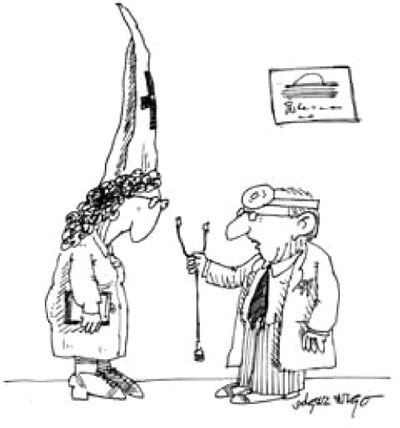1.1.1 How questions shape answers
So why do I split asking questions into these two types? Well, in answering that question I shall first deal with some crucial issues about the process of gathering information from other people. You see, the way you ask your questions will have a significant effect on the answers you’re given. They will be affected by the context, the words you use and your tone.
The context affects the answer
A couple of examples will help make sense of this. First, imagine that you ask a senior colleague about a complex issue on her way to a meeting, for which she is already late. Do you think that she’ll give the same answer as if you asked her the same question when she’s winding down at the end of the week? Second, you want to ask a question about your firm’s marketing strategy and its impact on operations; do you think you’d get a fair answer from the manufacturing director shortly after he’s had a furious row with the sales and marketing director?
Now these examples are somewhat extreme, but they do illustrate the problem of choosing the best context to get answers that will help you develop successful practice. So how can you make a wise decision about where and when to ask someone your questions? Here are five questions that might help you decide.
Do you have many or only a few (perhaps one) questions to ask?
This is a simple point; if you only have one quick question to ask then obviously it won’t be necessary to organise a formal interview. Just seek an appropriate moment to ask your question. If, however, you have a series of related questions then this will probably need a fixed period of time when you won’t be interrupted.
Does your question require a considered or spontaneous answer?
Some questions will require your respondent to think carefully; perhaps you are asking her to make a judgement or evaluate some piece of information. On the other hand, sometimes you will want a spontaneous answer, one that hasn’t been thought about for too long. Of course, you have to be careful with questions of the latter sort; are you being fair to your respondent in not giving them time to think?
Does your respondent have time available for an extended conversation or would they appreciate a very brief conversation?
Before now, I have got halfway through a series of questions with a colleague when I noticed them looking at their watch and displaying an increasing desire to be somewhere else. Such a situation does not bode well for the quality of the answers that you’ll get!
Is the answer to your question likely to be of a sensitive or confidential nature?
An extreme example of this would be ‘What do you think of Joe’s chance of promotion?’, just as Joe was standing next to you. Do you think that the answer might be affected by Joe’s presence?
What is your relationship with the respondent?
Are you asking a question of a friend, your boss, a stranger or a subordinate? Each is likely to answer your question differently. Your friend might well try to think what answer would help you. An older, more senior colleague might shape her answer so as to give you advice or she might dismiss the question with a cursory answer. A subordinate might want to please you or be worried about how their answer might affect them.
Each of these questions will help you consider how your respondent’s answers might be affected by the context in which you talk with them. As you think those issues through you will then work out the best way to tackle the conversation with your respondent. Of course, there are times when you can’t organise events in the best possible way and you will have to be satisfied with a less than perfect ‘interview’. There are two points to consider when this happens. First, it becomes really important in such situations to keep a good record of what happened and what you think might have affected the answer you were given. Second, as you make sense of what your respondent has said, you will need to consider how the context affected his or her answer.
Your words will affect the answer
How you ask your questions will have an effect on the answers given.
Activity 1 Leading and closed questions
Take a look at Box 1, which is a scene from the 1980s satire, Yes, Prime Minister.
Notice how the nature of the questions Sir Humphrey asks pushes Bernard towards the final answer that he wants. These are called leading questions. Also notice how the questions require a simple yes or no answer; these are called closed questions.
Now, as a general piece of advice, you should avoid asking leading questions unless, like Sir Humphrey, you want to make a point and so get something done. Even then, it’s probably unwise and it certainly is likely to provide you with information of a very doubtful quality. Closed questions can also be problematic. There are some occasions, especially in questionnaires and surveys, where closed questions are necessary; for example, you might want to know if a colleague was at a particular meeting. However, in a practice-centred inquiry, you are often looking for information from people you will be working with and open questions give a respondent more opportunity to shape the answers she gives. There may be a benefit in this as it will give you a deeper sense of how this colleague will co-ordinate with you as you take action. I’ll say more about this aspect of asking questions in the section on interviews below. The point I want to make here, however, is that the way you ask questions will shape the answers you get and you will need to think very carefully about your questions, either before you ask them or later as you try to make sense of the answers.
Your tone will affect the answer
In addition to the particular words you use, your tone of voice will affect the answers that you are given.
Activity 2 Tone of voice
Consider the following question: ‘You wouldn’t argue with the boss, would you?’ This same question could be asked in very different tones of voice, for example:
- In a threatening voice by a senior manager
- In a voice of ‘wide-eyed’ shock and awe
- In a matter-of-fact voice by a market researcher.
What do you think the answer would be to each tone of voice?
Comment
Here again the relationship between the questioner and respondent is crucial to how the question is understood by the respondent. I suspect that you can identify somewhat different answers to the same question!

